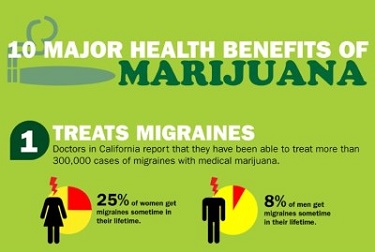 So, why does the federal government want to eliminate its usage?
So, why does the federal government want to eliminate its usage?
Simply put, as many health experts agree, it's all about control and money. Let's face it -- there's a huge market for this substance, and it poses a major threat to the pharmaceutical industry.
Here are just a few of the many health benefits associated with medical cannabis:
- It can stop HIV from spreading throughout the body.
- It slows the progression of Alzheimer's.
- It slows the spread of cancer cells.
- It is an active pain reliever.
- It can prevent or help with opiate addiction.
- It combats depression, anxiety and ADHD.
- It can treat epilepsy and Tourette's.
- It can help with other neurological damage, such as concussions and strokes.
- It can prevent blindness from glaucoma.
- Its connected to lower insulin levels in diabetics.
Deconstructing 6 major marijuana myths:
Let's examine and refute some of the propaganda that puts users in prison and holds this plant as a Schedule I drug.
(1) No medical merit
In 1974, the NIH (National Institutes of Health) funded the Virginia Medical College to do studies that would determine the damaging effects of marijuana, such as immune system damage. Instead, they found that marijuana reduced brain tumor growth in lab rats. The DEA stepped in and canceled the study and forced destruction of the study documents.Since then, there have been countless studies and testimonies proving cannabis efficacy at curing many diseases and maladies, including several cancers, effectively and without side effects.Even patients who were told by mainstream medical doctors to get matters in order because death was around the corner managed to survive in better health than before after a few months of ingesting cannabis with THC, the compound with psychotropic effects (http://www.naturalnews.com).
(2) Marijuana dangers, pharmaceutical hypocrisy.
In 1976, president Gerald Ford granted Big Pharma exclusive rights for researching cannabis while banning public research. Of course, Big Pharma's interest is to study enough of anything natural to figure out how to synthesize it and be able to patent it as a pharmaceutical for big bucks. Natural substances can't be patented or monopolized. Big Pharma succeeded with its synthesis of cannabinoid THC, and the FDA approved Marinol in 1985 to curb vomiting and lack of appetite for chemotherapy patients.
In 1992, Marinol was FDA-approved for AIDS patients to prevent anorexic wasting away. So synthetic THC without many of the 65 other cannabinoids that provide healing was ruled a Schedule III drug with lower potential for abuse than drugs in the first two categories, accepted medical use and mild to moderate possible addiction. Then, in 2003, another synthetic cannabis patent was approved to create drugs purportedly effective for neurological disorders, including epilepsy and Parkinson's. This patent claimed synthetic CBD content (another cannabinoid) while eliminating THC.
(3) Marijuana destroys brain cells.
As part of the "War on Drugs" under Ronald Reagan, a study was done to prove that smoking pot destroyed brain cells. Monkeys were strapped into face masks connected to smoke from marijuana for hours at a time. The lack of oxygen damaged their brain cells, because the smoke was all they could breathe for long periods.Since then, there have been studies disproving this notion, here's one (http://www.naturalnews.com).
(4) Marijuana is a gateway drug.
Even alcoholic beverage drinkers believe that the first whiff of marijuana leads to your first needle as a heroine addict. This connection is mostly just not there. There have been many life-long potheads, some famous, who don't even consider those synthetic street drugs.
(5) Marijuana is addictive
Then how come there are so many who have tried or used it for a few years then stopped without interventions or painful withdrawals?
(6) Marijuana makes one lazy and unproductive.
That's not the way this long-term heavy user of medical marijuana, successful stock broker/financial planner, family man and weekend volunteer sailing instructor for the underprivileged and handicapped experiences it (http://www.naturalnews.com).The social stigma and legal restrictions are fading state by state and even Washington, DC, to allow cannabis medicinal and/or recreational use.
Sources for this article include:
http://www.alternet.org, http://www.thedailysheeple.com, http://patients4medicalmarijuana.wordpress.com, http://www.truthonpot.com http://medicalmarijuana.procon.org, http://science.naturalnews.com
About the author:
Paul Fassa is dedicated to warning others about the current corruption of food and medicine and guiding others toward a direction for better health with no restrictions on health freedom. You can visit his blog at http://healthmaven.blogspot.com
Some of the health benefits of medical cannabis are explained
- Treats Migraines
- Cannabis healing has been very effective in the treatment of migraine headaches. Migraine headaches are vascular in source and are often preceded by an air characterized by nausea, flashes of light, faintness or photosensitivit
- Slows Down Tumor Growth
- Studies have shown that cannabis help in slow down the facsimile and slow down the production of cancer cells in body. It is also a natural antiemetic, which makes it effectual in plummeting the nausea and vomiting related with chemo and radiation therapies. So taking marijuana slows down the tumor growth too.
- Relieves Symptoms of Chronic Diseases
- Marijuana is one of the best natural pain relievers that can help sufferers of chronic pain live more relaxed lives. The side effects are often much less severe than the other common pain medications.
- Prevents Alzheimer’s
- Cannabis reduces the occurrence of depression in Alzheimer's patients, which can help patients to keep up a higher level of brain function. That is a powerful way to keep patients performance for a longer time after the first onset of Alzheimer's disease.










